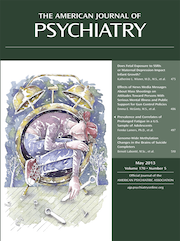To Treat or Not to Treat Perinatal Depression With Antidepressant Medication: Effects on Infant Growth
The physician managing major depression during pregnancy and lactation must weigh the risks and benefits of treating with antidepressant medication. Investigators examining this question in previous work found that women with major depression during pregnancy were at increased risk for preterm birth and having infants with low birth weight and intrauterine growth restriction (1, 2). Antidepressant use during pregnancy also is associated with adverse outcomes: women treated with a selective serotonin reuptake inhibitor (SSRI) have a two- to threefold greater risk of preterm birth and a higher rate of delivering low-birth-weight infants than do women with no SSRI exposure during pregnancy (3, 4). In a previous study by Wisner et al. (1), preterm birth rates and infant weight, length, and head circumference for women with untreated major depression or SSRI treatment during pregnancy did not differ from those of women with neither major depressive disorder nor SSRI exposure during pregnancy. As Wisner and colleagues note in their article published concurrently with this editorial (5), much of the other investigative work in this area is limited by not having a group of women with untreated major depressive disorder, a group with SSRI or other antidepressant treatment, and a comparison group without major depressive disorder or SSRI exposure during pregnancy to differentiate the effects of treatment on reproductive outcomes. In addition, many of the previous studies did not examine longer-term effects on infant outcomes. The distinguishing feature of the current study by Wisner et al. is that it examines all three groups of women during pregnancy: those with an untreated depression, those with depression receiving SSRIs, and those with neither major depression or antidepressant treatment during pregnancy. Furthermore, the investigators examined women not only during pregnancy (at 20, 30, and 36 weeks gestation) but also for up to a year postpartum (at 2, 12, 26, and 52 weeks). Other strengths of the study include its prospective design, thorough participant (mother and child) assessments of clinical history, and physical examination by raters blind to condition. Thus, this study sets the gold standard as to how to conduct sound methodological investigations in this field so that clinicians and patients have the necessary information to make informed decisions about reproductive choices.
The comparison with healthy women without major depression or antidepressant treatment during pregnancy or postpartum revealed that in women with perinatal depression, neither exposure to untreated major depression nor treatment with an SSRI affected the infant growth variables of weight, length, and head circumference up to 1 year of age. In the initial stages of development at least, a lack of infant growth can have long-term medical and social consequences (e.g., increased risk of mental retardation, receipt of a disability pension or Social Security benefits, lower education level or income, less likelihood of establishing a family) (6). Thus, the findings from Wisner et al. are reassuring in that they suggest that at least factors regulating infant growth are robust enough in the process of infant development not to be perturbed significantly by major depression or its treatment with antidepressant medication.
The next developmental task in this area of investigation is to use the sound methodological techniques provided by these investigators to decipher whether the perturbations of major depressive disorder or antidepressant treatment have long-term effects on other aspects of infant development, namely neurocognitive and social-emotional growth, as work by Nulman et al. (7) and Murray et al. (8, 9) suggests. As Stephansson and colleagues (10) wrote in their recent article on the effect of SSRIs during pregnancy on stillbirth and mortality, decisions about the use of SSRIs during pregnancy must take into account other perinatal outcomes and the risks associated with maternal mental illness.
1 : Major depression and antidepressant treatment: impact on pregnancy and neonatal outcomes. Am J Psychiatry 2009; 166:557–566Link, Google Scholar
2 : A meta-analysis of depression during pregnancy and the risk of preterm birth, low birth weight, and intrauterine growth restriction. Arch Gen Psychiatry 2010; 67:1012–1024Crossref, Medline, Google Scholar
3 : Neonate characteristics after maternal use of antidepressants in late pregnancy. Arch Pediatr Adolesc Med 2004; 158:312–316Crossref, Medline, Google Scholar
4 : Selective serotonin reuptake inhibitor (SSRI) use during pregnancy and effects on the fetus and newborn: a meta-analysis. J Perinatol 2005; 25:595–604Crossref, Medline, Google Scholar
5 : Does fetal exposure to SSRIs or maternal depression impact infant growth? Am J Psychiatry 2013; 170:485–493Google Scholar
6 : Long-term medical and social consequences of preterm birth. N Engl J Med 2008; 359:262–273Crossref, Medline, Google Scholar
7 : Child development following exposure to tricyclic antidepressants or fluoxetine throughout fetal life: a prospective, controlled study. Am J Psychiatry 2002; 159:1889–1895Link, Google Scholar
8 : Socioemotional development in adolescents at risk for depression: the role of maternal depression and attachment style. Dev Psychopathol 2006; 18:489–516Crossref, Medline, Google Scholar
9 : Cognitive vulnerability to depression in 5-year-old children of depressed mothers. J Child Psychol Psychiatry 2001; 42:891–899Crossref, Medline, Google Scholar
10 : Selective serotonin reuptake inhibitors during pregnancy and risk of stillbirth and infant mortality. JAMA 2013; 309:48–54Crossref, Medline, Google Scholar



